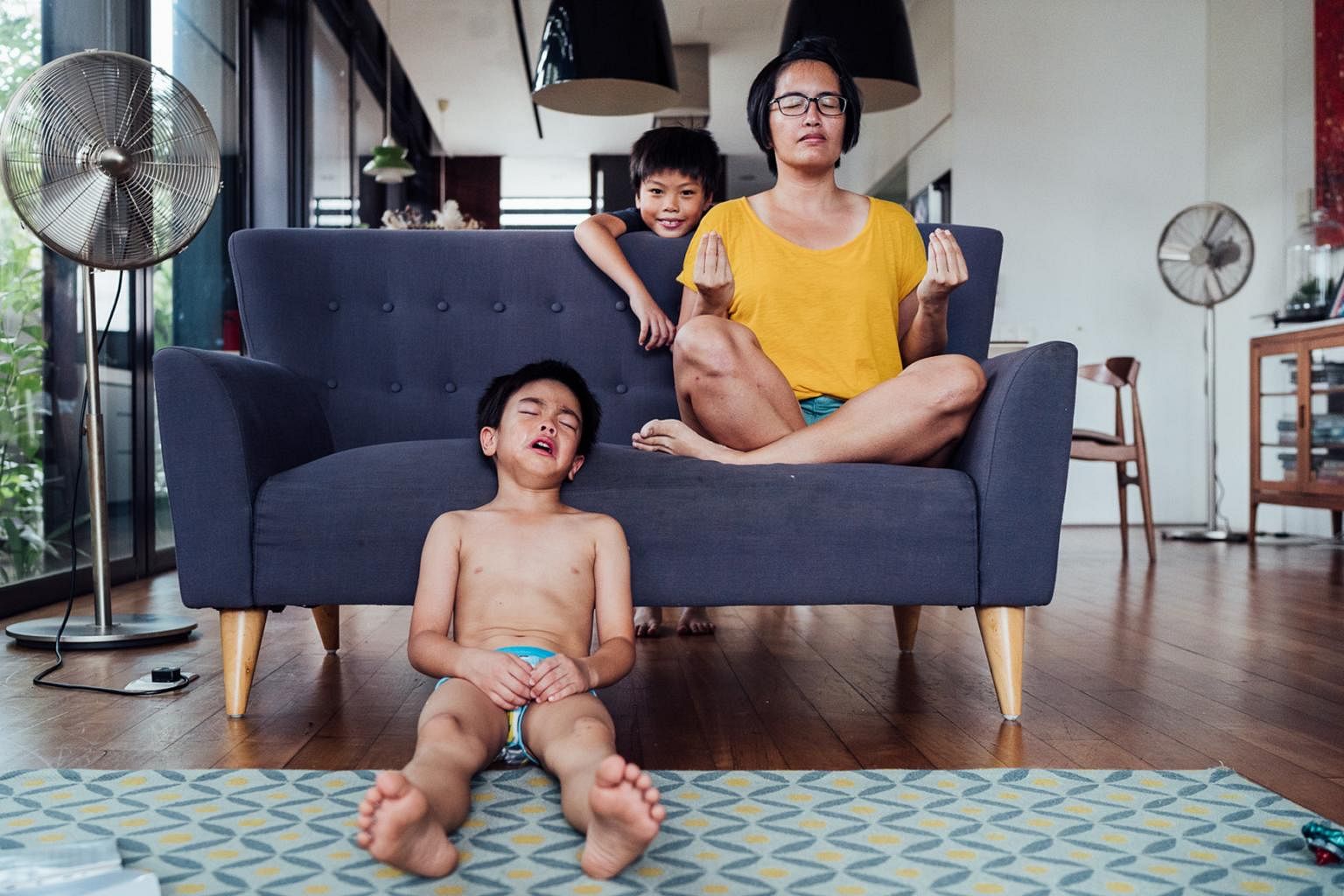SINGAPORE - Tired of missing her firstborn's milestones, Ms Fathiah Nur Liyana Rokhmat, 35, quit her job as a teacher in 2012 to be a stay-at-home mum.
When boredom set in, she started sewing special occasion outfits for relatives and friends. Her hobby blossomed into a bridal wear business called Fanurly, a play on her name.
The eight-year-old business was "thriving", she says. Buoyed by the expectation of more Malay weddings, she invested her profits in a showroom early this year.
Then the pandemic hit, brides cancelled their orders and she had to cut the lease short.
She spent the circuit breaker doing "a lot of crying", while taking the opportunity to spend time with her four children, aged nine to one.
Then, an idea came. Ms Liyana, whose husband, 35, is a civil servant, started offering wedding-worthy masks and niqab (face coverings) about two weeks ago. They haev proven to be a hit and she has sold more than 100 pieces, with prices ranging from $28 to $38.
It is a far cry from her bridal wear, which starts from $800 to rent and from $1,500 to buy. Still, she is not giving up.
"I'll definitely continue doing this business, but I probably have to pivot to something else" she says, adding that off-the-rack outfits for solemnisations is an option she is exploring as weddings scale down.
The Covid-19 crisis has dealt a double whammy to mumpreneurs like Ms Liyana. Not only have they had to transform their businesses quickly, they also have had to deal with extra childcare duties and supervising home-based learning during the circuit breaker and beyond.
Mumpreneurs have been a growing economic community in the last decade or so, as more millennial mothers give up full-time work to start home-based businesses that grant them the flexibility to spend more time with their children.
When Ms Sher-li Torrey founded Mums @ Work in 2010, she "struggled to get people interested" in the career portal for mothers looking for work-life balance.
Her events in the early days attracted about 20 to 30 mums. Today, a 100-person workshop can be fully booked within two days, she says.
Out of Mums @ Work's 43,000 members today, some 3,000 are mumpreneurs or women who are interested in making the switch.
While exact figures on the number of mummy-owned businesses are hard to pin down, the Housing Board (HDB) says there are currently about 5,200 women running registered businesses under its Home Office Scheme.
The scheme covers businesses such as accounting, real estate, transport and advertising.
In comparison, about 6,600 women ran registered businesses from their HDB flats in 2008 but the drop may be because entrepreneurs now have the option of using the many co-working spaces available, including Trehaus @ City Hall, which has its own preschool.
HDB issues guidelines, but does not require registration for those under the Home-Based Small Scale Business Scheme, which includes businesses such as home bakers, artists, tuition teachers and beauty service providers.
Mum-owned businesses have also evolved with the times, Ms Torrey notes.
Where mumpreneurs a decade ago used to sell kids' clothing and toys, today, they offer everything from coaching for special needs children to green products.
Six months into the pandemic, businesses in every industry have had to reflect, relearn and refine their strategies, but mumpreneurs are doing it with additional stressors.
Ms Huang Shao-Ning, chief angel and partner at AngelCentral, a community of angel investors, says mothers have always been expected to be "omnipresent" at home, solving multiple problems. She was a judge at the recent Alibaba Cloud-Singapore University of Social Sciences Online Demo Day.
"When you add on the complication of running a business, the stress more than triples," she says.
Mums @ Work held an impromptu online meeting on April 6, a day before the circuit breaker started, and Ms Torrey found that most mumpreneurs wanted to adapt to the changing landscape, but did not know how.
A few also sought her advice about returning to full-time work as their husbands had lost their jobs.
"In addition, being mothers, having to deal with home-based learning was an additional stress for them. Many of them really struggled - some of them mentioned they were slightly depressed as things looked quite challenging," she says.
Crib, a women-led business community formed in 2014, reports similar sentiments among its mumpreneur members.
At least 60 per cent of its more than 300 members are entre- preneurs with kids, who found themselves juggling business, family life and HBL responsibilities.
"Many of our retail members were severely impacted by the circuit breaker measures, seeing a major drop in production and sales and, for some, a 100 per cent drop in revenue.
"Many had to reinvent the way they conducted business to a solely digital strategy overnight," says Ms Tjin Lee, its co-founder.
One mum who had to transform her company quickly is Ms Vanessa Ong, 43, founder and managing director of Gernise Global, which deals in plastics, and Mamashop, which offers eco-friendly products.

She found herself working seven days a week during the circuit breaker as she had to supervise her twins' home-based learning (HBL), manage the household and cook.
She has no helper and her husband, 43, is an essential worker in the marine industry.
"Managing working from home and HBL drove me nuts," she says.
She founded Mamashop in 2016 after looking for environmentally-friendly items for her twins, now aged seven.
While she used to focus on selling to retailers and corporations, she had to overhaul her business quickly when her retail partners closed during the circuit breaker and corporate orders were put on hold.
She already had an e-commerce website, but online consumers have little brand loyalty. So she created regular marketing activities, from contests and giveaways to collaborations with other businesses and influencers.
For instance, when bubble tea shops had to close, she shared a DIY bubble tea video online to promote her eco-friendly bubble tea straw, and sent some to influencers to try. This boosted sales for two weeks.
Now that malls have opened in Phase 2, she is seeing business-to-business opportunities resume, but will continue to have both online and offline platforms.
"I learnt that mumpreneurs can be wonder women. We can multitask as a mum, a chef, a teacher, a boss, an entertainer and even a fitness coach," she says.
Other mothers, like Ms Shireena Shroff Manchharam, 37, learnt to overcome their fears and rediscovered the simple joy of family routines.

Before Covid-19, the certified image consultant and life coach found herself stretched running Sheens Image Consulting and managing her handbag and accessory shop, House Of Sheens.
At the same time, she wanted to be there when her kids, aged seven and 10, returned home from school and to put them to bed at night.
She is married to a 42-year-old who is the founder and chief executive officer of 8M Real Estate, a property and investment group.
The pandemic threw a curveball into her carefully planned schedules. "Initially, I was spending so much time helping my son with e-learning and then I realised it was more important for him to try his best. It made him responsible and independent."
Seeing the pandemic as an opportunity rather than a loss shifted her mindset, she says. "I was able to pivot and take my coaching online, started doing Instagram live sessions, which initially freaked me out, and live webinars."
While staying at home, her family bonded by sharing their highs and lows of the day during dinner, and she encouraged her kids to practise gratitude by journaling.
"We did huge puzzles, colouring projects, did The Straits Times' colouring challenges and singing challenge, bought bikes, went on two-hour walks every Saturday and Sunday morning, we cooked and baked together - the list is endless.
"It showed us that kids don't need much; they need us."
Not all mum businesses adapted well to the online sphere, though. Take management consultant-turned-photographer Kerry Cheah, 41, for instance.

She started Red Bus Photography in 2014 after looking in vain for a documentary-style family photographer for her own brood.
During the circuit breaker, she tried a virtual shoot - where the photographer directs a subject over video call and takes a screenshot - but felt it required "too much intervention" for her approach, which captures candid, unguarded moments.
"I would like to have been able to say that I invested this time in up-skilling, marketing or improving my business operations. The truth is that I was in pure survival mode, which, for me, meant keeping my family alive and our relationships with each other as undamaged as possible," she says.
Instead, she kept herself creatively engaged by regularly photographing her sons, aged eight and seven, and working on a series of self-portraits.
Now that she can resume work in Phase 2 of the re-opening, she has a newfound gratitude for her craft.
"I believe that the pandemic has shown many of us that the future is impossible to predict, and that our daily routines and simple comforts of home are worth documenting for posterity," says Ms Cheah, who is married to a 45-year-old financial investor.
While many mumpreneurs are still adapting to new ways of doing business, some luckier ones report brisk sales.
Ms Lee Siu Siu, 34, is one of the success stories. The former engineer started selling baby care items online in 2018 so she could spend more time with daughter Averie, now three. Sales are up 30 per cent at her shop, Happy Abby, on e-commerce platform Shopee, as more parents shopped online for supplies during the pandemic.
Ms Lee, who is married to a 35-year-old engineer, says she earns about the same as she did when working full-time, but works only about four to five hours a day and has weekends off for her family.
Still, Ms Lee, who is expecting her second child in September, found it "quite challenging" during the circuit breaker as she had to entertain Averie during the day, and could work only during the girl's naptime or after tucking her into bed.
Meanwhile, Mums @ Work and Crib are both reaching out to help mumpreneurs who need support.
Mums @ Work has organised webinars for free or a nominal sum on topics such as website know-how and free digital marketing tools.
It also partnered with co-working space One & Co on a series of videos on mumpreneurs, and is in talks to develop more ways to publicise its members' companies.
Crib created social content campaigns for its members, including shopping guides and promotions, as well as weekly webinars. It also launched a Digital JumpStart Programme to help mum bosses access relevant government funds.
Ms Huang of AngelCentral says that while the pandemic has "amplified all these inherent stresses and contradictions of mumpreneurs", they should take ownership of their decisions. "See all experiences as learning episodes and come out as a winner in them all."
Life coach Ms Manchharam believes the pandemic has given mummy business owners valuable lessons to reflect on.
"I have learnt that I don't have to do it all. We place so much emphasis and pressure on ourselves to be the best entrepreneurs, the best mums, have the smartest kids, the most beautiful homes," she says,
"We need to accept change and adapt to life, which is never going to be the way you want. Often, I hear people 'waiting for the right time' but 'now' can be the right time."


